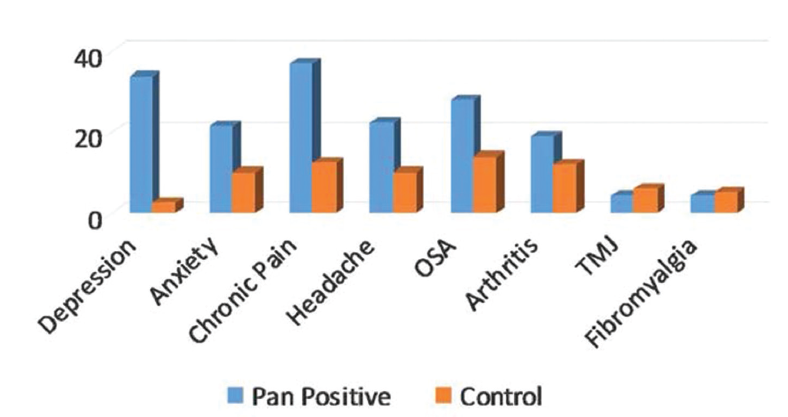
Comorbidities in patients with all-positive symptoms on sinonasal outcomes test quality-of-life instrument.
Image Caption: © 2015 The American Laryngological, Rhinological and Otological Society, Inc.
Are patients who are pan-positive on the 20-item Sinonasal Outcomes Test (SNOT-20) more likely to have certain underlying chronic illnesses than the general population presenting to a rhinology subspecialty office?
Background: Chronic rhinosinusitis (CRS) is among the most common chronic U.S. health conditions. Recently, there is increased reliance on validated patient-reported outcomes measures such as the SNOT-20 for diagnosis and treatment; however, subjective symptom scores often do not correlate with objective findings on CT and endoscopy, indicating that confounding factors are contributing to these patients’ symptoms.
Explore This Issue
December 2015Study design: Retrospective database review of 122 pan-positive SNOT-20 patients and 99 non-pan-positive SNOT-20 control patients from 2003 to 2011.
Setting: Department of Otolaryngology/Head and Neck Surgery, Georgia Regents University, Augusta.
Synopsis: Sixty-seven percent of the pan-positive patients were females, compared with 50% in the control group. Average total SNOT-20 scores and average Lund-Kennedy endoscopy scores were higher in the pan-positive group than in the control group. Anxiety, depression, chronic pain, and headaches were all significantly more common in the pan-positive group (anxiety: 21.4% versus 10.1 %; depression: 33.9% versus 2.4%; chronic pain: 37.1% versus 12.4%; headaches: 22.3% versus 10.1%). Obstructive sleep apnea and arthritis were more common in the pan-positive group (obstructive sleep apnea: 28.1% versus 14%; arthritis: 19% versus 12.1%) (see figure, right). There was no difference between groups for incidence of fibromyalgia, temporomandibular disorder, and chronic rhinosinusitis. In reviewing medications, antidepressants were significantly more commonly used by pan-positive patients.
Limitations included heavy reliance on medical records to identify comorbidities, potential use of certain medications for alternative reasons, and a lack of general quality-of-life scores such as the 36-item short form (SF-36) health survey or the mental health-specific PHQ-9, which would reinforce comorbidity findings.
Bottom line: Patients who report all symptoms as positive on the SNOT-20 are more likely to have underlying depression, anxiety, headaches, and chronic pain than patients who mark at least one symptom as zero on the form.
Citation: Caten A, Johnson C, Jang D, Gurrola J, Kountakis S. Comorbidities in patients with all-positive symptoms on sinonasal outcomes test quality-of-life instrument. Laryngoscope. 2015;125:2648-2652.